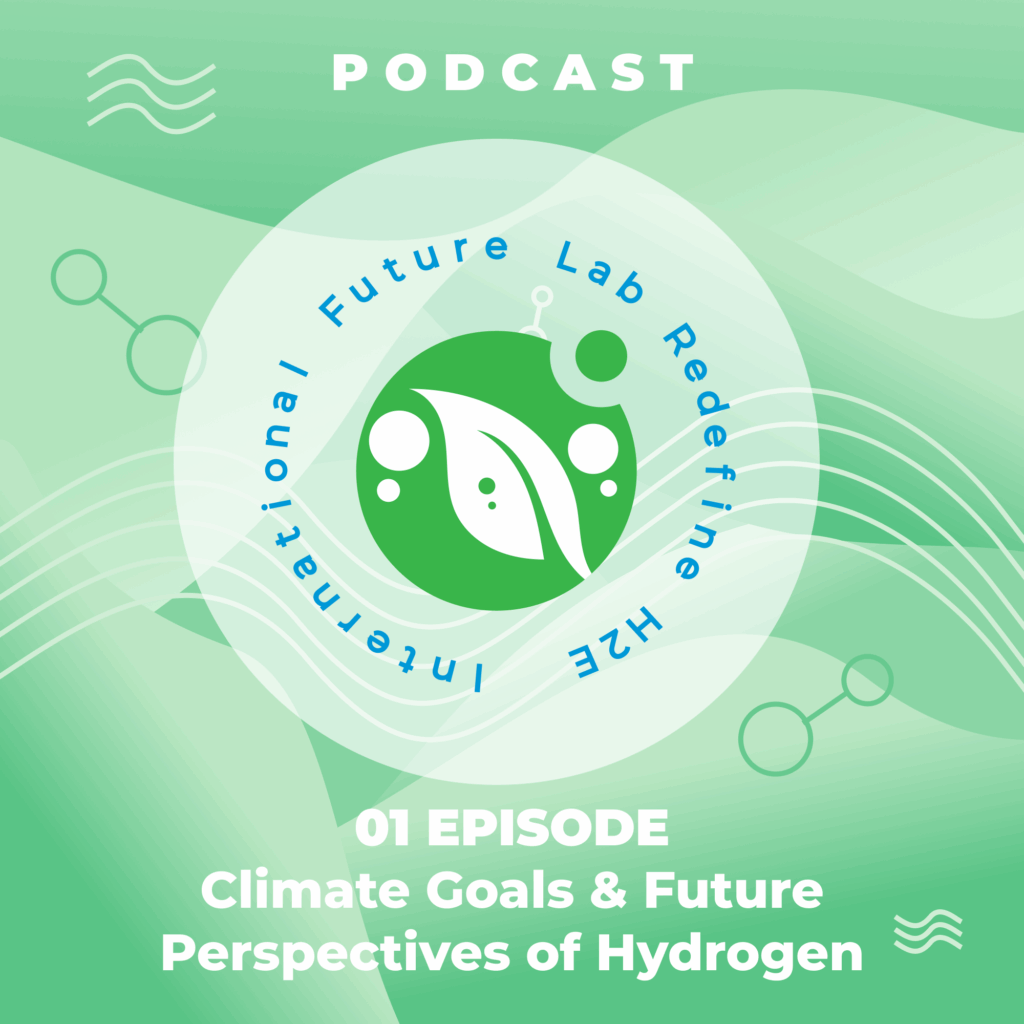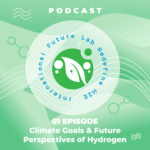EPISODE 01
Climate Goals and Future Perspectives of Hydrogen
Rethinking hydrogen. Redefining energy.
Whether it’s technical innovations, political frameworks, or economic developments, we deliver in-depth insights into one of the most exciting technologies driving the energy transition: green hydrogen.
We apologize for any technical deviations in the audio recordings.

About the episode
In this first episode, we take a look at current climate goals and the challenges they present. We discuss how various countries and organizations are committing to limiting global warming and the role clean energy plays in achieving these objectives.
Topics:
- Forecasts for the future development of hydrogen technologies
- Political and economic frameworks for hydrogen promotion
- International cooperation and initiatives in the hydrogen sector
Interview
The Future Starts with Hydrogen: Why H₂ Technologies Are Key to the Energy Transition
A short summary of the interview with Dr. Sebastian Fendt from the Future Lab REDEFINE H2E
As the world moves forward with the energy transition, the pressure to phase out fossil fuels is intensifying. One of the most promising solutions? Hydrogen — especially when it’s green, meaning it’s produced using renewable energy. In the Redefine H2E podcast, host Rebecca Singer talks to Dr. Sebastian Fendt, a core scientist at the BMBF-funded Future Lab REDEFINE H2E, about the opportunities, challenges, and policy frameworks surrounding hydrogen technologies.
Hydrogen’s Contribution to Climate Goals
In the 2015 Paris Agreement, the global community committed to limiting global warming to well below 2°C — ideally to 1.5°C—above pre-industrial levels. It’s an ambitious target that will be hard to meet without a fundamental transformation of our energy systems.
Sebastian Fendt:
The goal is ambitious but achievable, we need to shift away from fossil fuels to clean energy—and that’s where hydrogen comes into play. It’s particularly vital in hard-to-decarbonize sectors like heavy industry and long-haul transport. Countries like Germany, Japan, Norway, and the European Union have recognized this potential and developed national hydrogen strategies. What’s especially interesting, is that these strategies go beyond domestic production. They’re also building international partnerships to secure supply.
Technology Forecasts and Present-Day Challenges
Forecasts suggest that by 2050, hydrogen could account for up to 24% of global energy demand. The transport and industrial sectors are expected to be the main growth areas. So why isn’t hydrogen already playing a bigger role?
Sebastian Fendt:
The biggest hurdle is cost. Green hydrogen is still significantly more expensive than fossil fuels. Then there’s the infrastructure—pipelines, storage, refueling stations—it all still needs to be built. But with the right political support and investment, things could shift dramatically within the next 10 to 20 years.
Political Strategies and Economic Incentives
Germany’s National Hydrogen Strategy includes over €9 billion in investments through 2030. The European Union is also pushing hydrogen through its Green Deal. International competition for leadership in hydrogen technologies is already intense—but that’s not necessarily a bad thing.
Sebastian Fendt:
Competition drives innovation. It pushes us to improve technologies and reduce costs. What’s crucial, though, is that this competition leads to global cooperation. That’s the only way hydrogen can reach its full potential.
International Cooperation as a Cornerstone
One example of successful collaboration is the European H2Global initiative, designed to promote international trade in green hydrogen. Countries like Australia and several in the Middle East—thanks to their favorable climates—could become major producers and exporters in the coming years.
Sebastian Fendt:
These regions have enormous potential for low-cost hydrogen production. If we lay the groundwork now, we’ll see substantial progress in the next decade. A global hydrogen market isn’t a pipe dream—but we need to act now.
Conclusion: Shaping the Future
The conversation makes one thing clear: hydrogen is more than a buzzword. It’s a strategic element in making the energy transition succeed. To unlock its potential, we need investment, political resolve, and broad public engagement.
That’s exactly where the Redefine H2E podcast comes in. Future episodes will explore how green hydrogen is produced and where it’s already being used.
We want to make these topics accessible and inspire people to care. Because the energy transition affects us all.
Meet the Hosts

Rebecca Singer
Team Assistant
I am part of the BMBF-funded Future Lab Redefine H2E, a project located at the Chair of Energy Systems of the Technological University of Munich, Germany.

Dr. Sebastian Fendt
Project Leader and Core Scientist
I am a research group leader in the field of hydrogen and regenerative fuel production at the Technical University of Munich.





